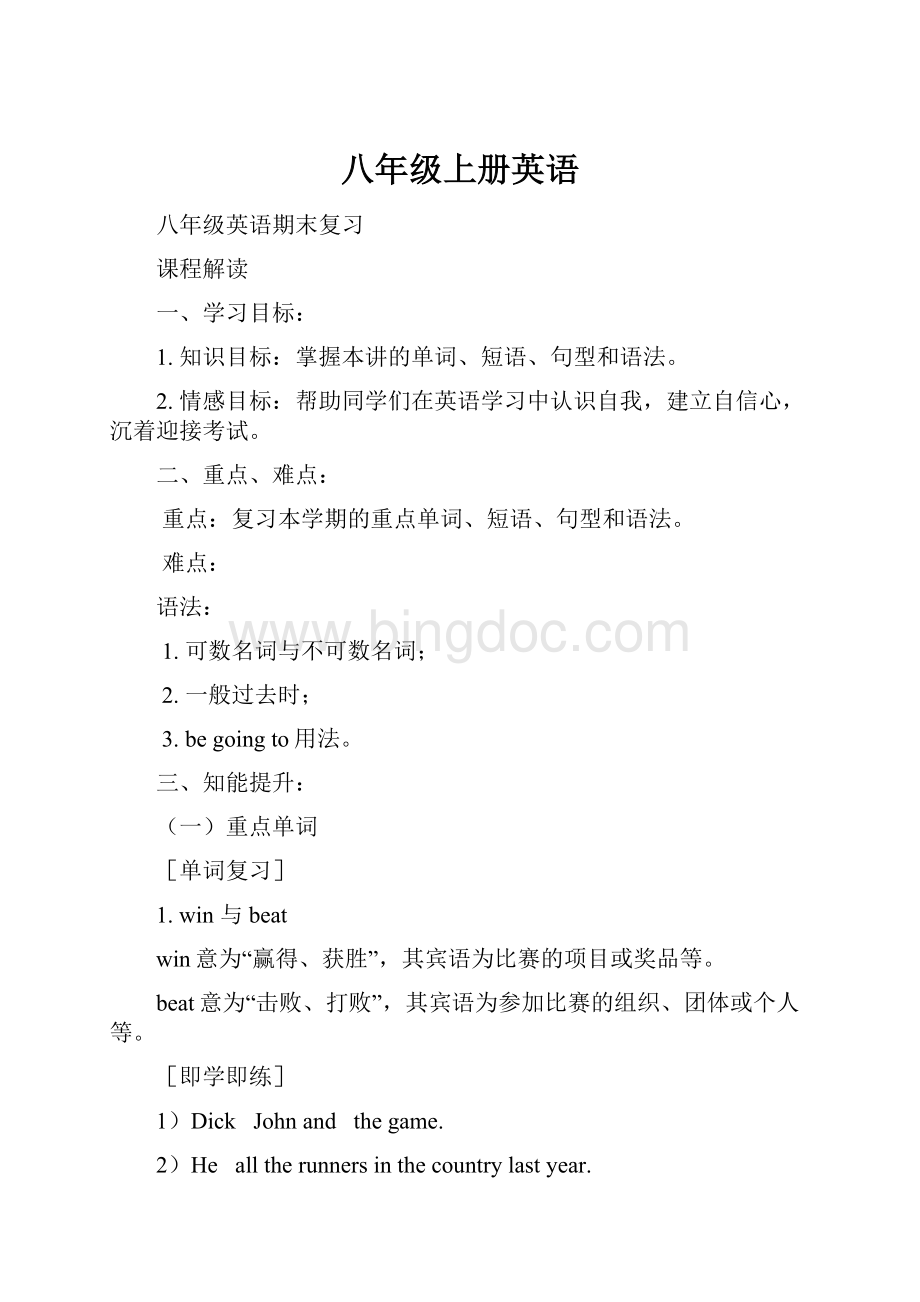八年级上册英语.docx
《八年级上册英语.docx》由会员分享,可在线阅读,更多相关《八年级上册英语.docx(18页珍藏版)》请在冰点文库上搜索。

八年级上册英语
八年级英语期末复习
课程解读
一、学习目标:
1.知识目标:
掌握本讲的单词、短语、句型和语法。
2.情感目标:
帮助同学们在英语学习中认识自我,建立自信心,沉着迎接考试。
二、重点、难点:
重点:
复习本学期的重点单词、短语、句型和语法。
难点:
语法:
1.可数名词与不可数名词;
2.一般过去时;
3.begoingto用法。
三、知能提升:
(一)重点单词
[单词复习]
1.win与beat
win意为“赢得、获胜”,其宾语为比赛的项目或奖品等。
beat意为“击败、打败”,其宾语为参加比赛的组织、团体或个人等。
[即学即练]
1)DickJohnandthegame.
2)Healltherunnersinthecountrylastyear.
3)Itwaseasyforhimtotherace.
2.because与becauseof
because用作连词,引导原因状语从句。
becauseof是介词短语,其后接名词、代词或动名词。
[即学即练]
1)—WhywasourteacherangrywithPeter?
—hetoldalie(谎言).
2)MrGuocaughtacoldtheterribleweather.
3)Myfatherdidn’tgotoworkbecausehehadasoreback.(改为同义句)
Myfatherdidn’tgotoworkhissoreback.
3.called
called是一个过去分词,其在句子中作定语修饰名词。
called意为“叫作……”,也可用named来代替。
[即学即练]
我有一个叫Mary的表姐。
IhaveacousinMary.
4.make与do“做”法各异
这两个单词都有“做”的意思。
当我们说做某事时,常用do来表达;make则含有“制造”、“制作”和“准备”的含义。
make和do还有一些不同的习惯搭配,如:
dosomereading/shopping/cleaning/cooking“读书/购物/打扫卫生/做饭”,doone’sbest“尽某人最大努力”,dowellin“在……方面做得好”,doone’shomework“做家庭作业”,makeamistake“犯错”,makemoney“挣钱”,makethebed“整理床铺”,makeatelephonecall“打电话”,makefriendswithsb.“与……交朋友”等。
此外,do还常用作助动词,用来构成疑问句或否定句。
Make则常用“make+宾语+动词原形”结构,意为“使;让……做……”。
[即学即练]
用make或do的适当形式填空。
1)Sheakiteforhersisteryesterday.
2)Shealwaysherownclothes.
3)Inthepast,manystudentsnotknowtheimportanceofEnglish.
4)Pleaseyourbedbeforebreakfast.
5)Sheoftenhelpshermotherhouseworkonweekends.
5.borrow,lend和keep“借”法不同
borrow意为“借入”,通常与介词from连用,构成短语borrowsth.fromsb.意为“从某人那里借某物”;lend表示“借出”,通常与介词to连用,构成短语lendsth.tosb.,意为“把某物借给某人”;keep的本意是“保存”,可表示“借……一段时间”。
[即学即练]
1)HowlongmayIthebook?
2)Thankyouverymuchforittome.
3)DavidaneraserfromSusanamomentago.
(二)重点短语
[短语复习]
1.turnup,turndown,turnon,turnoff,open,close
[即学即练]
1)I’mreadingnow.Pleasetellhimtotheradioabit.
2)Wouldyoupleasethelightwhenyousleep?
3)Thereistoomuchnoiseoutside.CouldyoupleasetheTVabit?
4)Shethedoor,goesintotheroom,theradioandlistenstomusic.
2.attheend与intheend
attheendof…可用来表示时间,意思是“在……结束的时候”,其反义词组是atthebeginningof…。
还可用来表示地点,意思是“在……的尽头”。
intheend意为“最后,终于”,相当于atlast或finally。
[即学即练]
1)下课前,老师给我们留了一些作业。
theclass,theteachergaveussomehomework.
2)Alantriedmanytimestopasstheexam,and,hewassuccessful.
3.attheageof…
是一个用来表示年龄的介词短语,意为“在……岁时”,相当于“when…yearsold”。
[即学即练]
HelefthomeforBeijingwhenhewas16yearsold.(改为同义句)
HelefthomeforBeijing16.
4.too…to…
意为“太……而不能……”,该结构形式上是肯定的,但意义上是否定的。
其中,too意为“太,过于”,其后需接形容词或副词,to为不定式符号,其后接动词原形。
[即学即练]
1)她太小了,不能上学。
2)Thisboyissoyoungthathecan’tgotowork.(改为同义句)
Thisboyisyounggotowork.
5.takepartin与join
takepartin通常指参加某一项活动,如比赛、会议等。
join指加入某党派、团体、群体、组织等并成为其中的一员。
[即学即练]
1)Hisbrothertheguitarclublastyear.
2)Ithegameyesterday.
(三)重点句型
[句型复习]
Couldyouplease+动词原形…?
与CouldI+动词原形…?
前一句型在英语口语中常用来表示请求别人做某事,后一句型用来表示请求别人允许自己做某事。
这种由could引导的一般疑问句,作肯定回答时常用:
Yes,sure./Certainly./Yes,(do)please./Ofcourse(youcan)./Withpleasure./Goahead,please.等;作否定回答时常用:
Certainlynot./Sorry,Ican’t./I’mafraidyoucan’t./I’msorry,but…等。
注意:
答语中要避免重复使用could。
此外,一般不说No,youcan’t.,因为这样显得不礼貌。
[即学即练]
1)你能把这些书带到教室去吗?
是的,可以。
—carrythebookstotheclassroom?
—Yes,.
2)我可以玩电脑游戏吗?
恐怕不行。
—playcomputergames?
—I’mafraid.
3)Couldyoupleasetotakeoutthetrash?
(改错)
4)Couldyoupleasedon’tturnontheTV?
(改错)
(四)重点语法
[语法复习]
1.“可数名词”、“不可数名词”&“howmany与howmuch”
howmany与howmuch都可用于询问数量的多少,但howmany后接可数名词复数;howmuch后接不可数名词。
另外,询问物品的价格时,常用howmuch(多少钱)。
[即学即练]
用所给词的正确形式填空。
1)Pleaseputtwo(teaspoon)of(honey)intothebowl.
2)Heatethree(slice)of(bread)forbreakfast.
对划线部分提问。
1)Hisfatheratethreeapplesfordinner.
applesdidhisfathereatfordinner?
2)Benneedsthreeteaspoonsofsalt.
saltdoesBenneed?
3)Hewouldliketwoslicesofbread.
slicesofbreadwouldhelike?
4)Thisshirtis80yuan.
isthisshirt?
2.一般过去时
一般过去时表示过去某个时间里发生的动作或状态;过去习惯性、经常性的动作、行为;主语所具备的能力和性格。
基本结构:
主语+动词过去式+其他;
否定形式:
①was/were+not②在行为动词前加didn’t,同时还原行为动词;
一般疑问句:
①Was/Were+主语+其他②Did+主语+动词原形+其他。
一般过去时记忆口诀:
一般过去时并不难,表示过去动作、状态记心间。
动词要用过去式,时间状语句末站。
否定句很简单,didn’t站在动词原形前,其他部分不要变。
一般疑问句也好变,did放在句子前,主语、动词原形、其他部分依次站。
特殊疑问句也简单,疑问词加一般疑问句记心间。
最后一条请注意,动词过去式要牢记。
[即学即练]
按要求改写句子。
1)Hefinishedschoolattheageofeighteen.(改为一般疑问句并作肯定回答)
—heschoolattheageofeighteen?
—,.
2)IwrotetoWeiFangyesterday.(对划线部分提问)
youyesterday?
3)Myfatherhadlunchinhisofficetoday.
yourfatherlunchtoday?
用所给动词的适当形式填空。
1)(be)yourfatherinShanghailastweek?
2)John(nothave)supperathomeyesterday.
3)“Whatyou(do)lastnight?
”“IwatchedTVwithmyparents.”
3.“begoingto”表示将来&“wh-疑问词(组)”
begoingto结构用来表示按计划、安排将要做的事或根据目前状况推测将要发生的事。
动词be有am,is,are的变化形式,其否定句或疑问句的形式通过be的变化来实现。
表示“某地将有……”时,可用“Thereis/aregoingtobe+主语+将来时间”这一句式。
[即学即练]
1)HisauntmovedtoAmericalastyear.(用nextyear替换lastyear)
HisaunttoAmericanextyear.
2)Arthurisareporternow.(用whenhegrowsup替换now)
Arthurareporterwhenhegrowsup.
3)We’regoingtostudyFrenchnextmonth.(改为一般疑问句)
yougoingtoFrenchnextmonth?
4)I’mgoingtobeanartistwhenIgrowup.(对划线部分提问)
aregoingtobewhenyougrowup?
5)明天上午将有一场时装表演。
Thereafashionshowtomorrowmorning.
4.形容词与副词的原级、比较级、最高级
形容词和副词的比较级用于两者(人或事物)之间的比较,表示其中一个比另一个“更……”或“较……”。
比较级常见的句型有:
1)Ais+比较级+thanB.意为:
A比B更……。
Heisolderthanyou.
2)Which/Whois+比较级,AorB?
意为:
A和B哪一个/谁更……?
Whoistaller,youorhe?
3)as…as…意为:
……与……一样,表示两个人或事物在某一方面程度相同时,用“as+形容词或副词原形+as”的句型。
Herunsasfastashisbrother.
as…as…的否定句是notas…as…或notso…as…,表示某人或某物在某一方面不及其他人或物。
Lucyisn’tas/socarefulasLily.
4)“the+比较级+ofthetwo+复数名词”表示“两者中较……的一个”。
Peteristhetallerofthetwoboys.
5)“比较级+and+比较级”表示“越来越……”。
Whenspringcomes,thedaysgetlongerandlonger.
Englishbecomesmoreandmoreimportantinthemodernworld.
6)“The+比较级,the+比较级”表示“越……,就越……”。
Themorewegettogether,thehappierwe’llbe.
7)比较级前可用even,alittle,abit,much,alot,far等修饰语表示比较的程度。
WithmyEnglishteacher’shelp,myEnglishismuchbetterthanbefore.
形容词的最高级用于三者或三者以上的人或事物之间的比较,表示在一群人或一组事物中,其中“最……”的情况,其前通常带定冠词the。
最高级常出现在以下句型中:
1)带有in或of短语的句子。
in或of在句子中表示范围时,要用形容词的最高级形式。
in表示“在……内”,意为“在某范围内”,不一定是同类;of表示属性,意为“在同类中”。
Heisthetallestinourclass.
Heisthetallestofthethree.
2)Who/Whichis+最高级,A,BorC?
在选择疑问句中,如果有三者或三者以上供选择,且有or连接时,要用最高级。
Whoistheshortest,Tom,TimorJim?
3)oneof+最高级+复数名词
表示“(在众多……当中)最……之一”的意思,这是形容词最高级中常见的句型。
Thisisoneofthemostimportantbooks.
[即学即练]
1)—Whichisthe,thesun,theearthorthemoon?
—Thesun.
A.biggerB.smaller
C.biggestD.smallest
2)Jackieisthananyotherboyinhisclass.
A.shortB.shorter
C.theshortestD.shortest
3)Thiswatchismoreexpensivethanthatone.
A.muchB.many
C.afewD.lotsof
4)MrGreenisasashisbrother.
A.athleticB.moreathletic
C.athleticerD.mostathletic
5)BeihaiParkisoneofparksinBeijing.
A.beautifulB.morebeautiful
C.mostbeautifulD.themostbeautiful
6)Remember,boysandgirls.youwork,resultyouwillget.
A.Thebetter,theharderB.Theharder,thebetter
C.Thehard,thebetterD.Theharder,thegood
7)—Theclassroomiscleanitwasyesterday.
—Sorry,Iforgottocleanit.
A.notso,asB.so,as
C.as,asD.more,than
8)Ourcountryisgetting.
A.strongandstrongB.morestrongerandstronger
C.muchmorestrongerD.strongerandstronger
同步练习(答题时间:
45分钟)
I.单项选择
1.Iwanttowatchtheballgame.CanyoutheTV?
A.openB.close
C.turnonD.turnoff
*2.Yougetupsoearly,butyoumustgotoworkontime.
A.mustn’tB.haveto
C.mayD.needn’t
3.Thereisashopthestreet.
A.bytheendofB.intheend
C.attheendofD.ontheend
4.—Howwasyourday?
—Yesterday?
Wonderful!
A.awayB.off
C.farD.of
5.Theboxisheavyforhim.Let’shelphim.
A.very,tocarryB.too,tocarry
C.too,carryD.very,carrying
6.Hissisteraspeechcontestyesterday.
A.enteredB.wentin
C.takespartinD.tookpartin
7.—Couldyoupleasetellmewheretherestroomis?
—
A.Yes,IcouldB.Icould
C.SureD.Icouldtellyou
8.Heoftenborrowsmoneyothersbuthedoesn’tlendanythinganybody.
A.from,fromB.to,from
C.from,toD.to,to
*9.Ididn’tknowtheboyRick.
A.callB.name
C.callingD.called
10.MrGreenwaslateforworktheheavyrain.
A.becauseofB.although
C.soD.because
*11.—CouldIaskyouquestionsourservice?
—Sure.
A.some,aboutB.any,about
C.any,onD.some,with
12.Myfatheroftengoestoworkbreakfast.It’sbadforhishealth.
A.haveB.with
C.tohaveD.without
*13.Davidistallerthanboyinhisclass.
A.otherB.another
C.anyotherD.others
14.Wehavemoneytobuythenicecoat.
A.fewB.enough
C.manyD.muchtoo
*15.—Whoplayssoccerinyourclass?
—LiLei
A.best,playsB.best,does
C.better,playsD.better,does
*II.完形填空
ManyAmericansaretryingtoloseweight.Someeatlessfoodandhardlyhaveanyfatsorsweets.Othersdorunning,1withmachines,takemedicine,orevenhaveoperations.Soyoucanseelosingweightis2work,anditalsocostsalotofmoney.
But3dosomanypeopleintheUSwanttoloseweight?
Because